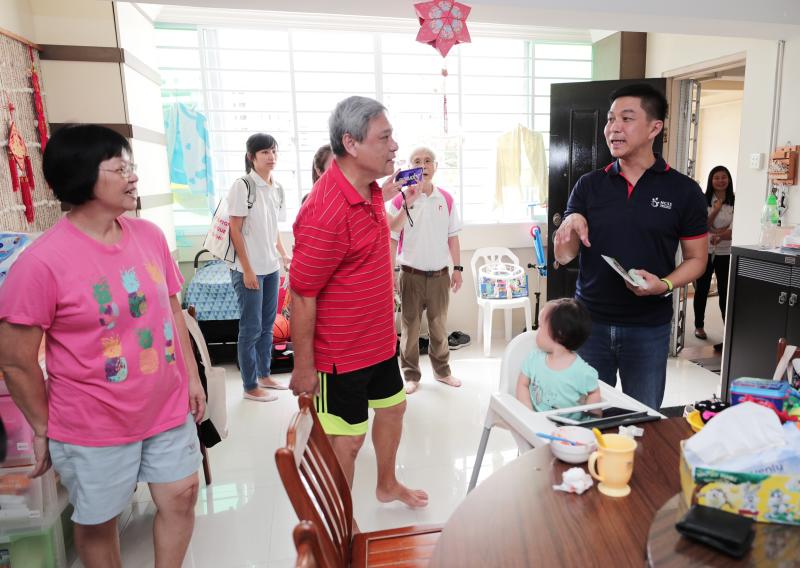Rise in dengue cases as Singapore enters peak season for the disease
Sign up now: Get ST's newsletters delivered to your inbox

Marine Parade GRC MP Tan Chuan-Jin went house to house with grassroots volunteers to spread awareness of the current dengue situation and advocate for dengue prevention on June 1, 2019.
ST PHOTO: KELVIN CHNG
SINGAPORE - The number of weekly reported dengue cases has been on an upward trend as Singapore enters its warmer months, with the figure tripling over the past nine weeks, said the National Environment Agency (NEA).
For the week ending on May 25 this year, there were 379 reported cases of dengue, which is 70 more than the previous week. This is the highest weekly number since March 2016, said the agency in a release on Saturday (June 1).
The total number of dengue cases this year as of May 25 is also three times what it was for the same period of time last year, with 3,918 cases this year and 1,058 cases in 2018.
"We are currently in the peak dengue season and expect the cases to rise further," said the NEA, adding that the number of cases involving the more serious dengue haemorrhagic fever is also at a high of 32 cases.
On Wednesday, Singapore saw its fourth dengue death this year, when a 63-year-old man died from the disease. His home in Hougang Avenue 1 is not an active dengue cluster.
The three earlier victims, two men and a women, were all in their 70s.
As Singapore tides through the peak dengue season, there has also been an increase in efforts to fight the mosquito-borne infection.
As part of these efforts, Marine Parade GRC MP Tan Chuan-Jin went door to door with grassroots volunteers on Saturday to spread awareness of the current dengue situation and advocate dengue prevention.
The Chai Chee Road area, which comes under Mr Tan's ward, is the currently third-largest dengue cluster in Singapore. The first two are located in Woodlands.
"We know that dengue can have serious consequences and we want to remind our residents about that," said Mr Tan in a doorstop interview after visiting about 80 units in the area.
"Our area is fairly serious... so I think it's really important for us to play a part to deal with it together," he added.
The NEA said that for the first three months of this year, about 60 per cent of breeding habitats were found in residential premises, and this figure remains high.
"It's surprising because a lot of (households) say they have cleaned up," said Mr Tan. "But even the simple things, for example when water collects in the rims of a pail that has been turned over, those little bits of water can actually breed mosquitoes."
Following the national dengue campaign launched in early April, there have been more than 440 dengue prevention events and activities conducted across the island.
The NEA has also stepped up checks to remove potential mosquito breeding habitats in public areas and housing estates. For the first three months of the year, the NEA conducted about 224,000 inspections, including 1,800 checks carried out at construction sites.
It uncovered about 2,900 instances of mosquito breeding habitats, and as of March this year, it also fined more than 600 households for mosquito breeding. About 70 notices to attend court and seven stop-work orders were also issued to construction sites.
As part of efforts, the NEA has been deploying drones since 2016 to help officers inspect roof gutters for stagnant water that can lead to mosquito breeding. It is also developing "smart" gravitraps that attract female Aedes mosquitoes looking for sites to lay their eggs. The traps can identify the species and gender of the mosquito and transmit the information to the NEA that will help it in data collection.
Urging residents to join in the efforts to fight dengue, Mr Tan said: "The key message is that dengue is something we can manage. But it needs all of us to play a part.
"So do step forward and support the effort, I think we can give it our best shot."


